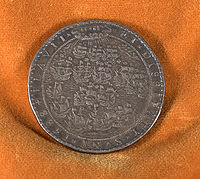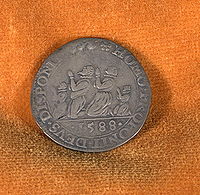
He blew with His winds, and they were scattered
Encyclopedia

Spanish Armada
This article refers to the Battle of Gravelines, for the modern navy of Spain, see Spanish NavyThe Spanish Armada was the Spanish fleet that sailed against England under the command of the Duke of Medina Sidonia in 1588, with the intention of overthrowing Elizabeth I of England to stop English...
in 1588, when the Spanish fleet was broken up by a storm, which was also called the Protestant Wind
Protestant Wind
The phrase Protestant Wind has been used in more than one context, notably:#The storm that lashed the Spanish Armada. According to Protestant propaganda, the wind wrecked the Spanish fleet and thus saved England from invasion by the army of Philip II of Spain...
. The phrase seems to have had its origin in an inscription on one of the many commemorative medal
Medal
A medal, or medallion, is generally a circular object that has been sculpted, molded, cast, struck, stamped, or some way rendered with an insignia, portrait, or other artistic rendering. A medal may be awarded to a person or organization as a form of recognition for athletic, military, scientific,...
s struck to celebrate the occasion.
Background
The conflict had clear religious dimensions. Relations between CatholicCatholic
The word catholic comes from the Greek phrase , meaning "on the whole," "according to the whole" or "in general", and is a combination of the Greek words meaning "about" and meaning "whole"...
Spain
Spain
Spain , officially the Kingdom of Spain languages]] under the European Charter for Regional or Minority Languages. In each of these, Spain's official name is as follows:;;;;;;), is a country and member state of the European Union located in southwestern Europe on the Iberian Peninsula...
and Protestant England
England
England is a country that is part of the United Kingdom. It shares land borders with Scotland to the north and Wales to the west; the Irish Sea is to the north west, the Celtic Sea to the south west, with the North Sea to the east and the English Channel to the south separating it from continental...
had been souring for a considerable period of time, eventually leading the outbreak of the Anglo-Spanish War in 1585. Events had been brought to a head by the English support of the Dutch Protestant United Provinces
Dutch Republic
The Dutch Republic — officially known as the Republic of the Seven United Netherlands , the Republic of the United Netherlands, or the Republic of the Seven United Provinces — was a republic in Europe existing from 1581 to 1795, preceding the Batavian Republic and ultimately...
in the Eighty Years' War. The Dutch were revolting against Spain, and to prevent further English support, Philip II of Spain
Philip II of Spain
Philip II was King of Spain, Portugal, Naples, Sicily, and, while married to Mary I, King of England and Ireland. He was lord of the Seventeen Provinces from 1556 until 1581, holding various titles for the individual territories such as duke or count....
planned an invasion of England. On 29 July 1587, he obtained Papal authority to overthrow Elizabeth, who had been excommunicated by Pope Pius V
Pope Pius V
Pope Saint Pius V , born Antonio Ghislieri , was Pope from 1566 to 1572 and is a saint of the Catholic Church. He is chiefly notable for his role in the Council of Trent, the Counter-Reformation, and the standardization of the Roman liturgy within the Latin Church...
, and place whomever he chose on the throne of England.
An Armada, the Spanish word for a battle fleet, was prepared to invade England, defeat its armies and depose Queen Elizabeth. Consisting of around 130 ships, 8,000 sailors and 18,000 soldiers, 1,500 brass guns and 1,000 iron guns, it was termed the "Great and Most Fortunate Navy". The Spanish Empire at this time was one of the wealthiest and most powerful in the world. England in comparison was considerably weaker, both economically and militarily, and since becoming Protestant on the accession of Elizabeth, lacked powerful allies on the continent.
Defeat of the Armada

Charles Howard, 1st Earl of Nottingham
Charles Howard, 1st Earl of Nottingham , known as Howard of Effingham, was an English statesman and Lord High Admiral under Elizabeth I and James I...
(later Earl of Nottingham), Sir John Hawkins
John Hawkins
Admiral Sir John Hawkins was an English shipbuilder, naval administrator and commander, merchant, navigator, and slave trader. As treasurer and controller of the Royal Navy, he rebuilt older ships and helped design the faster ships that withstood the Spanish Armada in 1588...
and Sir Francis Drake. The Armada was unable to pick up the Spanish army waiting in the Netherlands, and was forced instead to flee Northwards, around the East Coast of Britain, and attempted to return to Spain by sailing around the North coast of Scotland and around Ireland. Here, in addition to the usually rough seas, the ships ran into a heavy storm, sometimes described one of the most northern hurricanes on record. Already in poor condition after an extended period at sea, many ships were sunk, or driven onto the Irish coast and wrecked. Over 50 ships were lost and the Armada ceased to be an effective force. The ships that returned to Spain were in poor condition and their crews weakened and diseased from the long journey.
Aftermath
.jpg)
One of the most famous bore the inscription Flavit Jehovah et Dissipati Sunt (with the word "Jehovah" in Hebrew letters). This translates as 'Jehovah blew with His wind and they were scattered'. The inscription accompanied a scene of a fleet of ships on a stormy sea. The obverse displayed a church building, symbolizing the Protestant Church, remaining unmoved in a storm (symbolizing the Armada invasion). Other medals included one that showed a wrecked galleon, and on the obverse some people praying. Another large silver medal displayed a scene of some sinking ships on one side; on the other it satirized the Pope, King Phillip, and other clerics and rulers, who were shown with bandages over their eyes, and with their feet resting on a bed of sharp spikes. Yet another depicts a portrait of Queen Elizabeth, surrounded by her titles, and featuring on the obverse, an island on the sea with a large bay tree towering over a town, bearing the Latin inscription, Non Laedor Alidor, "Not even perils touch it."
Other medals used the Latin term for God, in the phrase Flavit Deus et Dissipati Sunt, and featured on the obverse, the biblical phrase of Matthew 2, 18:
In Rama was there a voice heard, lamentation and weeping, and great mourning, Rachel weeping for her children, and would not be comforted, because they are not.
Queen Elizabeth is supposed to have awarded a medal to her admirals, bearing the phrase. The alternative term, "The Protestant Wind" is sometimes used, again to emphasise the divine nature of the victory.
The phrase, along with Elizabeth's speech to the troops at Tilbury
Speech to the Troops at Tilbury
The Speech to the Troops at Tilbury was delivered on 9 August Old Style, 19 August New Style 1588 by Queen Elizabeth I of England to the land forces earlier assembled at Tilbury in Essex in preparation of repelling the expected invasion by the Spanish Armada....
, has become part of the popular mythology of the event, in a similar way that England expects that every man will do his duty
England expects that every man will do his duty
"England expects that every man will do his duty" was a signal sent by Admiral Horatio Nelson, 1st Viscount Nelson from his flagship HMS Victory as the Battle of Trafalgar was about to commence on 21 October 1805. Trafalgar was the decisive naval engagement of the Napoleonic Wars...
has become a part of the national heritage after the Battle of Trafalgar
Battle of Trafalgar
The Battle of Trafalgar was a sea battle fought between the British Royal Navy and the combined fleets of the French Navy and Spanish Navy, during the War of the Third Coalition of the Napoleonic Wars ....
. Altered and abbreviated versions of the phrase exist, such as God blew and they were scattered or God breathed and they were scattered.

